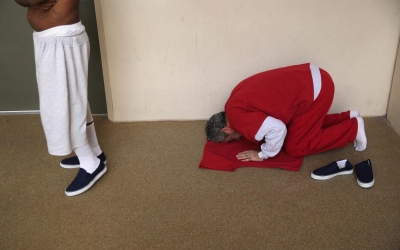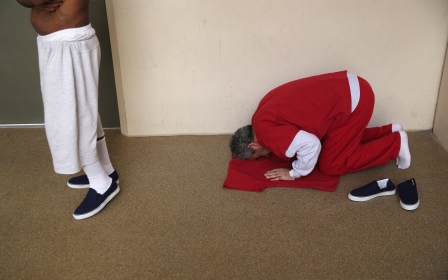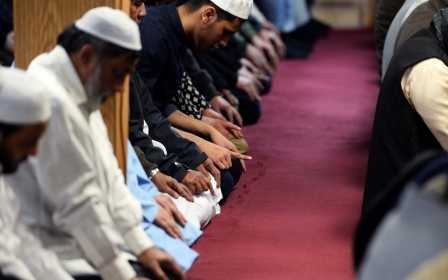Pork patties on the menu: For US Muslims, Ramadan in jail can be a tough sentence
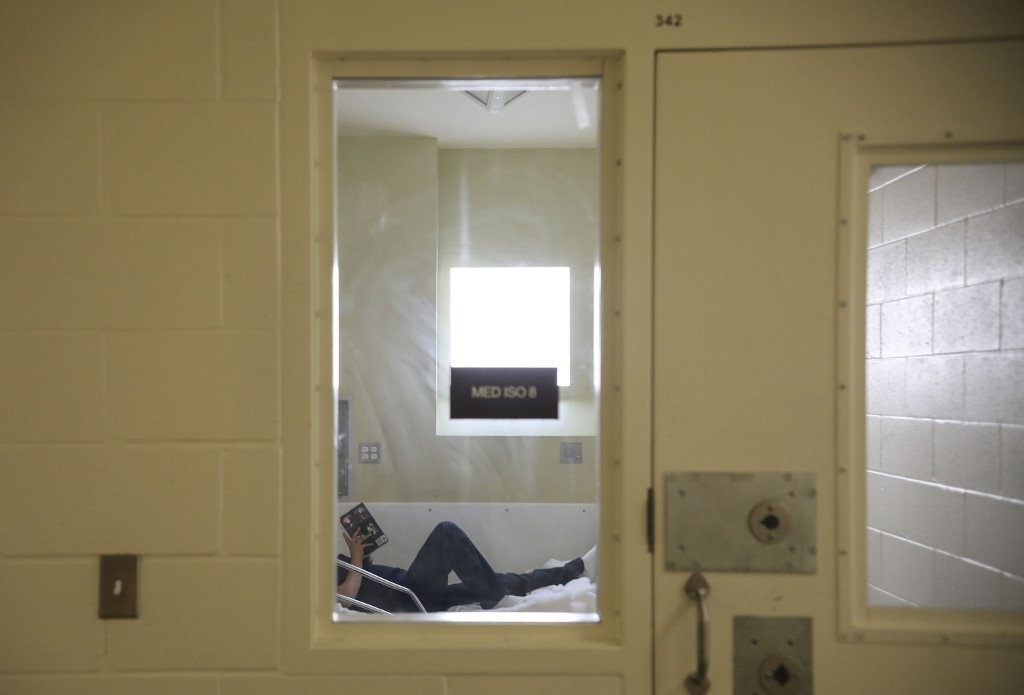
The sun was about to set as Tabari Zahir and a handful of other Muslim inmates made their way to the prison's cafeteria to break their Ramadan fast.
Since most of the other inmates at Jesup prison's low-security facility had eaten earlier, tables were stacked up and pushed out of the way for cleaning in the emptied dining hall.
Walking up to the serving line, the men were tired after a long day of abstaining from food and drink.
"What's on the menu," one of the inmates asked.
"Pork patties," the cook responded.
New MEE newsletter: Jerusalem Dispatch
Sign up to get the latest insights and analysis on Israel-Palestine, alongside Turkey Unpacked and other MEE newsletters
'I mean, even when the prison is running normally, it is hard [to fast]'
- Tabari Zahir, instructor at the Tayba Foundation
The words reverberated through the room, awakening the fasting men as confusion spread.
"If you don't know anything else about Muslims, you know they don't eat pork," Zahir explained, recounting the incident to Middle East Eye.
"The guard or the main cook said 'that's what's on the menu, that's what I'm cooking, if you don't like it - you can leave it'," Zahir said.
"Oh man, why did he say that? It almost turned into a riot."
Inmates who had been gently unstacking the dining hall tables began slamming them to the ground, "just to make noise", Zahir said, "bam, bam, bam".
The prison official on cafeteria duty pressed an emergency response button that summoned the rest of the units' guards, who raced down to the cafeteria. Once the situation was explained, the inmates were sent to the facility's chapel while a new meal was prepared.
But by the time they got to eat, an hour had passed.
Incidents like the one Zahir described are not uncommon in US prisons. Of the 163 religious freedom cases filed by Muslims in Federal Court between October 2017 and January 2019, 64 were complaints made about dietary needs, and another 34 were linked specifically to violations during the holy month of Ramadan.
Today, as the novel coronavirus spreads through US prisons, Muslim inmates are facing problems and restrictions on multiple fronts.
"It's going to be hard for everybody," Zahir said of Covid-19 restrictions. "But especially for people who are fasting."
"I mean, even when the prison is running normally, it is hard [to fast in jail]."
Zahir spent 11 years imprisoned on a non-violent drug charge. It was during his incarceration that he renewed his commitment to Islam and became a faith leader.
Released in 2016, Zahir now has a master's degree in social work and lives in Los Angeles with his wife and kids. He has worked for the past five years at the Tayba Foundation, a non-governmental group that supports individuals and families affected by incarceration.
Prisons and Covid-19
As more than 80,000 Muslim prisoners across the country mark Ramadan amid the pandemic, Zahir's work is now more important than ever.
Prisoners access to the outside world is restricted, and in many states, the only form of communication is through closed-circuit email systems, such as JPay in state prisons and CorrLinks in federal prisons.
Zahir keeps in contact with inmates mostly through email and handwritten letters. Sometimes inmates get a chance to call by phone and keep Tayba workers like Zahir updated on the latest happenings inside detention facilities.
Black Americans, who make up an overwhelmingly disproportionate share of the US prison population, as well as the Muslim inmate population, have also been disproportionately affected by the coronavirus pandemic.
According to the Centers for Disease Control and Prevention (CDC), Black Americans - about 13 percent of the US population - constitute 30 percent of all Covid-19 infections in the country.
Meanwhile, prisons have been hotspots for the virus's spread. In Ohio alone, some 3,700 inmates have tested positive for Covid-19 - 2,000 from the same prison.
Outside of work details, most facilities are on lockdown, which is not all that uncommon in prison, but this time it's different.
Most security lockdowns last for days, not months like this one. Inmates are getting sick on the inside while their family members are getting sick on the outside.
Social distancing double standards
Tensions are running high these days, Zahir said, and most prisoners don't have masks or enough soap, let alone hand sanitizer, which is widely banned. Prayer rooms are mostly closed, leaving inmates to pray alone in their cells during Ramadan, a time when community is of utmost importance.
One of the biggest complaints he's received, Zahir says, is the double standard in terms of social distancing expectations when it comes to work hours versus off-hours, when prisoners are locked down because of the virus.
The work that prisoners do varies from prison to prison. Some inmates sew uniforms and do laundry, while others fix plumbing or keep the prison clean. According to the Federal Board of Prisons they are paid anywhere from 12 to 40 cents an hour.
"When they go to work there's no social distancing because the workspace is the way it is... the guy who's sewing next to you is only two or three feet away," Zahir said.
Since many prison administrations have not provided masks, Zahir said inmates have started using scraps of fabric to sew their own.
Naquasia Pollard, who serves on the board of the National Religious Campaign Against Torture, noted that even if inmates are able to get their hands on masks, many prisons have barred their use, making it even more difficult to protect themselves from the disease.
Ramadan in prison
Standard meals during a lockdown come cold, in brown paper bags. So, instead of stewed meat and rice, Muslims in jails across the country are breaking their fasts on peanut butter sandwiches and packets of crackers inside their cells.
It is nowhere near enough calories to facilitate a fast, but peanut butter is better than ham, Zahir said.
"Ham sandwiches in prison are like a staple, really," he said.
The United States has a documented history of failing to meet the needs of its Muslim prisoners, particularly their dietary needs.
Last year, Muslim Advocates, a Muslim human rights group, documented several cases of prisons attempting to serve pork to inmates during Ramadan, similar to the incident with Zahir and his blockmates.
The group has also documented some prisons denying inmates their right to observe Ramadan at all.
This year, it reported that a Virginia prison had refused to facilitate some inmates' fasts during the month because "too many" prisoners had requested to be placed on a "Ramadan list".
Zahir said these sorts of problems could be avoided if prisons had more Muslims on staff, especially in dining halls, or if they could prepare their own food.
Pollard, who served 15 years at a women's state prison in Bedford Hills, New York, told MEE that during her incarceration she was permitted to prepare food for her fellow inmates.
"I was a cook, I would cook for the community because I was an amira [princess] and I thought that was the most beautiful thing," Pollard said, referring to a title often given to female religious leaders.
State v Federal
About 19 percent of all prisoners in New York are Muslim, according to Muslim Advocates. Still, unlike federal prisons, New York state, along with many other state facilities, does not offer a halal option for Muslim prisoners.
While some Muslims don't mind eating a kosher option instead, there have also been reports of them being denied kosher meals, which are costlier than the standard fare, because they had not registered as Jewish.
For her part, Pollard said that she believed the prison's restrictions simply came from a lack of information or exposure to religious practices.
"The guards felt like some were fake Muslims and they really weren't fasting, but I used to enlighten them, like that's not their call," Pollard said.
On several occasions, Pollard said, she explained certain religious practices to the guards, who would then accommodate them, once they realised they were religious needs.
Because Zahir had been in a federal facility, religious violations were taken more seriously, compared with state prisons, he said.
"When I meet state prisoners and I tell them I did all my time in the Fed, they're like 'Aw man, that was a golf club,' you know, they make comments like that," Zahir said.
In federal prison, if a prisoner thinks a violation has occurred, the inmate files a blue slip to make an official complaint and the complaint gets sent directly to a federal court.
Things get more complicated in state facilities, since each state has its own rules and procedures.
A string of blue slips on their records could look bad for federal prison administrators, so if the violation is one they know will hold up in court, administrators and guards work to remedy the problem, Zahir said.
'Sloppy Management'
The first time Zahir filled out a blue slip was during his first week in prison. His family was coming to visit and he had been sitting in his cell staring out the window, waiting to see them arrive.
He spotted his mother and two sisters walking up the asphalt; they were easily recognisable by their hijab-covered hair. Anxious energy washed over him as he waited for his name to be called over the intercom system. But it never came. Instead, about an hour later, he saw his family through the window again, walking back to their car.
He rushed to the phones and called his sister, only to be told that the guards had refused to let the women in because they had refused to remove their headscarves.
He immediately filled out a blue slip and took the complaint directly to the captain on shift.
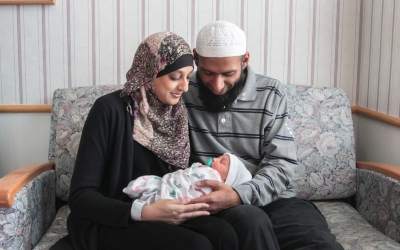
"I went straight to the captain with the blue paper already signed and everything, like, 'I'm filing this grievance right now and I know I have a case. I know you're in the wrong'," Zahir said.
"He looked at it, he just read it real quick, and he said 'I'm gonna fix this right now. Tell your family to come back tomorrow'," Zahir recounted.
Zahir withdrew his complaint. The next day his family was welcomed unabated and offered apologies from the captain as well as the prison chaplain.
Zahir said it was that incident that started him on the path of becoming a faith leader. While he has been free for more than half a decade, much of his life remains dedicated to incarcerated Muslims.
Currently, he is most concerned about prisoners enrolled in Tayba Foundation's inmate educational programme who have contracted the virus. Off the top of his head, he can think of at least seven students who have tested positive, and one Tayba staff member.
Zahir said "the vast majority" of complaints he has received during the coronavirus pandemic mostly boiled down to "sloppy management".
For his part, Zahir said the best way to support incarcerated Muslims, whether it be during the Covid-19 pandemic, Ramadan, or any other time of year, is through advocacy and outreach.
"This is the crux of the issue. The resources are not reaching the people who are incarcerated," he said. "Some of it is willful blindness. Some of it is that people just don't know."
Middle East Eye delivers independent and unrivalled coverage and analysis of the Middle East, North Africa and beyond. To learn more about republishing this content and the associated fees, please fill out this form. More about MEE can be found here.



